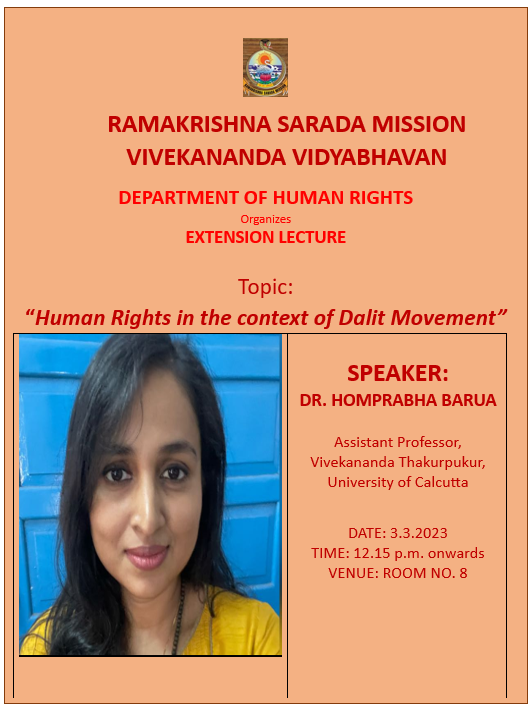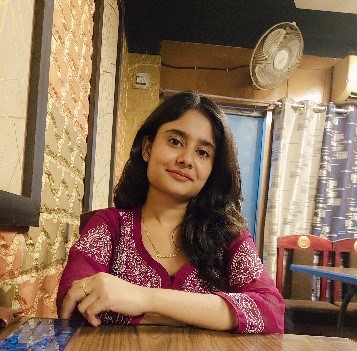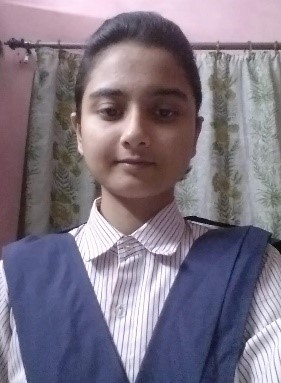
ABOUT THE DEPARTMENT
Initiation and Brief Overview
Human Rights as a subject was introduced at the undergraduate level in Ramakrishna Sarada Mission Vivekananda Vidyabhavan from 2006. Human Rights as an area of study is diverse and covers myriad topics such as tracing the historical development of Human Rights dating back centuries, United Nations and Human Rights, International Humanitarian Law and relevant issues as Women rights issues, Child rights issues, rights of Disabled Persons, Dalit rights, rights of Indigenous Peoples, rights of Refugees, rights of Migrant Workers, consumer rights and so on. Students of the Department participate in field visits, open book tests, group discussions, assignments and PowerPoint presentations. At present, the Human Rights Department has a two-member faculty with two SACT teachers.
Vision and outlook
Methods of teaching
Apart from classroom lectures or the chalk and talk method, the Department uses ICT based classes such as PowerPoint presentations, to stimulate learning interests. The Department also organizes several educational tours and activities each year for practical works to enhance the literary and cultural exposure of its students. Regular assessments through written classwork and class-tests ensure that the students are well prepared for their final end-semester examinations.
Infrastructure
The Department has its own sitting room for the teachers and a Departmental library for both the teachers and the students.
Email: humanrights@rksmvv.ac.in
Syllabus
WBSU Syllabus for Human Rights BA under UGC prescribed syllabus template for CBCS & NEP
https://wbsu.ac.in/web/wp-content/uploads/2020/06/HUMAN-RIGHTS-SYLLABUS-NEW.pdf
https://wbsu.ac.in/web/wp-content/uploads/2024/01/Human-Rights-NEP-syllabus.pdf
https://wbsu.ac.in/web/wp-content/uploads/2024/01/Human-Rights-Multidisciplinary-Course.pdf
The Human Rights field has become interdisciplinary in nature requiring the insights of various interconnected and diverse disciplines. The main objective of this course is to make awareness among the students regarding different aspects of Human Rights. At the initial stages they are informed regarding the historical & philosophical background of human rights, along with that different aspects of meaning & concept are also provided. Students gain knowledge regarding United Nation, UDHR, ICCPR, ICESCR and different social movements, such as Tribal movement, Dalit movements, women movement, &different ecological movement are also included in this course. Students can able to understand the importance of internalizing Human Rights and Duties especially about the urgent needs of the society. There are various concepts regarding the theories of Human Rights where different philosophers like John Locke, Jeremy Bentham, J.S.Mill, and Mary Wollstonecraft have depicted the classical, natural, moral theories through rights. There are various Indian concepts like “Rajneeti, Dandaneeti, Lokneeti, Nyaya, Dharma” where they can relate about the term “Democracy, Indian Penal Code and Justice”. There are various perspectives regarding feminist and religious through which they gain knowledge of various aspects. During this course student also get concepts regarding different conventions which are associated with the development of human rights, such as ICERD, CEDAW, CRC, CAT CRPD etc. Students are also encouraged to know regarding different important international conferences of Human Rights, such as -Tehran conference (1968),Vienna conference (1993),Beijing Conference (1995) etc. They also understand about the Separation of Powers (Legislative, Judiciary and Executive) and Law enforcing agencies. Apart from theory classes, practical classes are also conducted, where students are encouraged to do different practical takes, such as documentation, case study, power point presentation etc.
Department of Human Rights
Programme Outcomes: CBCS
PO1: Communication Skills: Confident to speak, write, read, listen and understand the English language and one or more Indian languages. Relate the ideas, knowledge, books, and people. Think and decide rationally, and adopt technology and electronic/print media in disseminating thoughts, facts and realities.
PO2: Social responsibility: Develop an obligation to act for the benefit of society at large. Cultivate the responsibility to maintain a balance between the economy and the ecosystems. Nurture a moral obligation to minimize the adverse effect on those immediately around them.
PO3: Critical, logical and rational thinking: Acquire the ability for objective, rational, skeptical, logical, and unbiased analysis of factual evidences to form a judgment or conclusion. Enhance the process of rational thinking, problem solving and analytical evaluation from different perspectives.
PO4: Enlightened and effective Citizenship: Cultivate progressive citizenship for a knowledge society for peace and prosperity of nations and the world. Develop clear, rational and progressive thinking. Participate in decision-making concerning the society and upholding national development, integrity, unity and fraternity.
PO5: Values and Ethics: Recognize the importance, worth and usefulness of principles and standards of behaviour and moral dimensions of one’s own decisions and judgements. Be aware of various aspects of social responsibility through social, outreach, and cultural activities during the programme. Shape a personality which understands and appreciates religious and cultural diversity and plurality.
PO6: Sustainable development: Understand, organize and promote the principle of human development goals by sustaining the ability of natural systems, natural resources and ecosystem services upon which the economy and society depends.
PO7: Life-long process of Learning: Cultivate the proficiency to engage in independent, life-long and progressive learning abilities in the broadest context of changing socio-political-economic-cultural and technological scenario.
PO8: Employment Skills: Be prepared for employment in various fields by developing reading, writing and comprehension skills which make the students fit and eligible for jobs in the government and non-government sectors. A broad spectrum study of various subjects helps the students compete in various examinations for employment after graduation.
Paper Name & Course Outcome: CBCS
Semester 1
GE1: HURHGEC01T/HURGCOR01T – Introduction to Human Rights – This paper aims to provide in depth knowledge about Conceptual Background of Human Rights and Duties, Importance of Internalizing Human Rights and Duties, Right to Peace. On the other side the practical portion of this course encourage students to make project report on any events of Human Rights
Semester 2
GE2: HURHGEC02T/HURGCOR02T – Constitution Vision of Justice -This paper aims to provide in depth knowledge about Philosophical And Ideals Of The Constitution And Landmark, Fundamental Rights, DPSP, Fundamental Duties, Articles, Judgements, Parliament, Supreme Court, High Court, Law Enforcing Agencies, CAPF, ITBP, BSF, CBI, ITD, DRI, NCB, Military. Practical portion of this course encourage students to make case study report on any events of Human Rights
Semester 3
GE3: HURHGEC03T/HURGCOR03T – International Human Rights mechanism and instruments – This paper aims to provide in depth knowledge about United Nation System and Human Rights, CEDAW, DEDAW, DEVAW, CRC, and CAT. In practical paper Students get the opportunity of Documentation
Semester 4
GE4: HURHGEC04T/HURGCOR04T – Human Rights Movement-This paper aims to provide in depth knowledge about The Various Important International Conferences and International Humanitarian Laws, Geneva Convention, Additional Protocol .In practical paper Students get the opportunity of Documentation
Semester 5:
DSE 1: HURGDSE01T – Conferences and Development – To know and develop a brief idea about Tehran and Vienna conferences. This paper aims to provide knowledge in details about the International Humanitarian Law and International Criminal Tribunals and different growth and Models. On the other side the practical portion of this course encourage students to make PowerPoint presentation on any events of Human Rights
DSE 2: HURGDSE02T– Regional Human Rights Regime and Democracy– This paper provide knowledge about the Concept of Social Research, Methodology, and Data Collection. On the other side the practical portion of this course encourage students to make Documentation on any events of Human Rights
GE 1: HURGGEC01T– Meaning and Concepts of Human Rights: This paper aims to provide in depth knowledge about Conceptual Background of Human Rights and Duties, Importance of Internalizing Human Rights and Duties, Right to Peace. On the other side the practical portion of this course encourage students to make review any book of Human Rights.
Semester 6:
DSE 3: HURGDSE03T- Research Methodology – To get an idea about Research Methodology, Sampling, Questionnaire, different types of Research, Quantitative and Qualitative methods. On the other side the practical portion of this course encourage students to document three recent cases on Human Rights protection or Human Rights Violation.
DSE 4: HURGDSE04T – Growth Models and Human Rights – This paper aims to provide in depth knowledge about civil societies, International Interventions, Amnesty International, PUCL, and PUDR. On the other side the practical portion of this course encourage students to make Chart Presentation on any events of Human Rights.
GE 2: HURGGEC02T– Human Rights in India: Indian Constitution and Domestic laws – This paper aims to provide in depth knowledge about Philosophical And Ideals Of The Constitution And Landmark ,Fundamental Rights, DPSP, Fundamental Duties, Articles, Judgements, Parliament, Supreme Court, High Court, Law Enforcing Agencies, CAPF, ITBP, BSF, CBI,ITD ,DRI, NCB, Military. Practical portion of this course encourage students to make Chart presentation on any events of Human Rights.
Skill Enhancement Course:
SEC1: HURSSEC01M– Introduction and theories of Human Rights: This paper aims to provide in depth knowledge about all the theories Of Natural, Legal, And Utilitarian. Practical: Project on Various Theories
SEC2: HURSSEC02M– United Nation System: This paper aims to provide in depth knowledge about The Peace and Security through United Nations System with Its Specialised Organs, Practical: Documentations
SEC3 – HURSSEC03M – : Indian Constitution and Human Rights: This paper aims to provide in depth knowledge about The Constitution of India, Supreme Court, High Court, And Parliament., and Practical: Project on Various Cases through Landmark Judgements
SEC4: HURSSEC04M – Conferences and Globalization: This paper aims to provide in depth knowledge about All the Sustainable Developments. Globalizations, Conferences, Practical: Documentations
Programme Specific Outcome:
After Completion of the course, Students will able to:
| COs | Knowledge level Bloom’s Taxonomy | PSOs mapping | |
| HURHGEC01T/HURGCOR01T | § Provide in depth knowledge about Conceptual Background of Human Rights and Duties; analyse importance of Internalizing Human Rights and Duties, and Right to Peace.
§ On the other side the practical portion of this course explore students to make project report on any events of Human Rights
|
Knowledge,Analyse,Explore | 1,3,8,9 |
| HURHGEC02T/HURGCOR02T | § Provide in depth knowledge and Understanding about Philosophical and Ideals of the Constitution. And Explain Landmark Judgement, Fundamental Rights, DPSP, Fundamental Duties, Articles, Judgements, Parliament, Supreme Court, High Court, and Law Enforcing Agencies, CAPF, ITBP, BSF, CBI, ITD, DRI, NCB, and Military.
§ Practical portion of this course encourage students to write case study report on any events of Human Rights.
|
Knowledge, Understanding, Explain, write | 1,6,7 |
| HURHGEC03T/HURGCOR03T | § Provide in depth knowledge about United Nation System and Human Rights. Compare and Relate CEDAW, DEDAW, DEVAW, CRC, and CAT.
§ In Practical paper Students get the opportunity of write Documentation.
|
Compare and Relate, write | 1,2,4 |
| HURHGEC04T/HURGCOR04T | § Provide in depth knowledge to elaborate the Various Important International Conferences and International Humanitarian Laws, Geneva Convention, Additional Protocol.
§ In practical paper Students get the opportunity to prepare and summarise Documentation |
to elaborate, prepare and summarise | 4,5,6 |
| HURGDSE01T | § Provide knowledge to generalise Concept of International Conferences, International Humanitarian Law, International Criminal Tribunals, Growth and Models
§ In practical Students make PowerPoint Presentation in detail. |
Generalise, detail | 1,6,12,13 |
| HURGGEC01T | § Provide detailing about the Conceptual Background of Human Rights and Duties, Importance of Internalizing Human Rights and Duties, and Right to Peace. To Classify and Characterise different generation of Human rights.
§ On the other side the practical portion of this course encourage students to Review any book on Human Rights
|
Detailing, Classify, Characteristics. | 1,6,12, |
| HURGDSE04T
|
§ Describe in depth knowledge about civil societies, International Interventions, Amnesty International, TRIPS,TRIMS,AOA,Right to development,PUCL, and PUDR.To develop an idea about statistical measures.
§ Practical: Prepare Chart Presentation On Various Cases
|
Prepare,develop,describe | 6,11,10,14 |
| HURGGEC02T | § Develop in depth knowledge about Philosophical and Ideals of the Constitution and Landmark, Fundamental Rights, DPSP, Fundamental Duties, Articles, Judgements, Parliament, Supreme Court, High Court, Law Enforcing Agencies, CAPF, ITBP, BSF, CBI, ITD, DRI, NCB, Military.
§ Practical portion of this course encourage students to present a chart on any events of Human Rights
|
Evaluate, develop | 1,2,6 |
| HURSSEC01M | § Enumerate in depth knowledge about all the theories Of Natural, Legal, And Utilitarian.
§ Practical: Project On Various Theories in detail. |
Enumerate, detail | 1,2,3 |
| HURSSEC02M | § Describe in depth knowledge about the Peace and Security through United Nations System with Its Specialised Organs.
§ Practical: To prepare Documentations |
Describe, prepare | 4,5,6 |
| HURSSEC03M | § Explain in depth knowledge about The Constitution of India, Supreme Court, High Court, and Parliament.
§ Practical: Project to evaluate Various Cases Through Landmark Judgements |
Explain, evaluate | 7,8,9 |
| HURSSEC04M | § Summarise in depth knowledge about All the Sustainable Developments. Globalizations, Conferences.
§ Practical: To prepare Documentations
|
Summarise, prepare | 10,11,12 |
PO, CO Matrix
| PO1 | PO2 | PO3 | PO4 | PO5 | PO6 | PO7 | PO8 | |
| CO 1 | ||||||||
| CO 2 | ||||||||
| CO 3 | ||||||||
| CO 4 | ||||||||
| CODSE 5 | ||||||||
| COGE 5 | ||||||||
| CODSE 6 | ||||||||
| COGE 6 | ||||||||
| COSEC 1 | ||||||||
| COSEC 2 | ||||||||
| COSEC 3 | ||||||||
| COSEC 4 |
The following course offered under the NEP system:
Syllabus for NEP
https://wbsu.ac.in/web/wp-content/uploads/2024/01/Human-Rights-NEP-syllabus.pdf
https://wbsu.ac.in/web/wp-content/uploads/2024/01/Human-Rights-Multidisciplinary-Course.pdf
Programme Outcome for Bachelor in Arts (General)
PO1: Communication Skills: Confident to speak, write, read, listen and understand the English language and one or more Indian languages. Relate the ideas, knowledge, books, and people. Think and decide rationally, and adopt technology and electronic/print media in disseminating thoughts, facts and realities.
PO2: Social responsibility: Develop an obligation to act for the benefit of society at large. Cultivate the responsibility to maintain a balance between the economy and the ecosystems. Nurture a moral obligation to minimize the adverse effect on those immediately around them.
PO3: Critical, logical and rational thinking: Acquire the ability for objective, rational, skeptical, logical, and unbiased analysis of factual evidences to form a judgment or conclusion. Enhance the process of rational thinking, problem solving and analytical evaluation from different perspectives.
PO4: Enlightened and effective Citizenship: Cultivate progressive citizenship for a knowledge society for peace and prosperity of nations and the world. Develop clear, rational and progressive thinking. Participate in decision-making concerning the society and upholding national development, integrity, unity and fraternity.
PO5: Values and Ethics: Recognize the importance, worth and usefulness of principles and standards of behaviour and moral dimensions of one’s own decisions and judgements. Be aware of various aspects of social responsibility through social, outreach, and cultural activities during the programme. Shape a personality which understands and appreciates religious and cultural diversity and plurality.
PO6: Sustainable development: Understand, organize and promote the principle of human development goals by sustaining the ability of natural systems, natural resources and ecosystem services upon which the economy and society depends.
PO7: Life-long process of Learning: Cultivate the proficiency to engage in independent, life-long and progressive learning abilities in the broadest context of changing socio-political-economic-cultural and technological scenario.
PO8: Employment Skills: Be prepared for employment in various fields by developing reading, writing and comprehension skills which make the students fit and eligible for jobs in the government and non-government sectors. A broad spectrum study of various subjects helps the students compete in various examinations for employment after graduation.
Programme Specific Outcome:
Course Outcome Human Rights Minor (NEP):
Min Sem1: Introduction to Human rights – To impart knowledge regarding historical and philosophical foundation of Human Rights and their classifications. Basic understanding of the concepts of Right and Duties. To have in-depth knowledge regarding different revolutions, PIL, International Bill of Human Rights, Adequate Standard of Living and different Indian Concepts related to Human Rights. Practical portion of this course encourage students to make case study on any events of Human Rights.
Min Sem2: Constitution vision of Justice– To develop a basic understanding of constitutional perspectives, classifications and regimes. To promote respect for all without any discrimination. To make a clear concept of Law Enforcing agencies and Indian Constitution ensures Human Right by guaranteeing Fundamental Rights to every citizen of India. Practical portion of this course encourage students to make Documentation on any events of Human Rights.
Min Sem3: Human Rights Mechanism and Instruments – To have clear idea about The United Nation. To know the concept and importance of different movements related to Human Rights such as Apartheid, National freedom movement, Dalit, Tribal, Women. To know about different conventions related to Refugees, Women, Racial Discrimination. Practical portion of this course encourage students to make case study on any events of Human Rights.
Min Sem4: Conferences and Development – To gain knowledge about different conferences such as Tehran, Vienna, Rwanda, Yugoslavia, and ICC.To have clear understanding regarding the Growth and Models of Human rights. Practical portion of this course encourage students to make PowerPoint Presentation on any events of Human Rights.
Min Sem5: Research Methodology – To have clear idea about Meaning, Types, Scope of Research and different techniques of Sample, Data Collection. To compute various Statistical techniques such as Mean, Median, Mode and SD. Practical portion of this course encourage students to make case study on any events of Human Rights.
Min Sem6: Organisations and Human Rights – To develop basic understanding of Civil societies and NGO’s.To understand various definitions of Democracy, Science and Technology, Social Inequality and Stratification, Self-Determination. Practical portion of this course encourage students to make case study on any events of Human Rights
MDC Sem1: Introduction to Human Rights: To impart knowledge regarding historical and philosophical foundation of Human Rights and their classifications. To have a basic concepts of Right and Duties. To have an in-depth knowledge about different theories of Human Rights, Globalisation and contemporary Human Right issues.
After Completion of the course, Students will able to:
| COs | Knowledge level Bloom’s Taxonomy | PSOs Mapping | |
| Minor I | § To describe knowledge regarding historical and philosophical foundation of Human Rights and their classifications. Basic understanding of the concepts of Right and Duties. To know and identify in-depth knowledge regarding different revolutions, PIL, International Bill of Human Rights, Adequate Standard of Living and different Indian Concepts related to Human Rights.
§ Practical portion of this course encourage students to evaluate case study on any events of Human Rights
|
Describe, evaluate, know, identify | 1,2 |
| Minor II | § To develop a basic understanding of constitutional perspectives, classifications and regimes. To promote respect for all without any discrimination. To elaborate a clear concept of Law Enforcing agencies and Indian Constitution ensures Human Right by guaranteeing Fundamental Rights to every citizen of India.
§ Practical portion of this course encourage students to prepare Documentation on any events of Human Rights
|
Develop, prepare, elaborate | 1,3,4,8 |
| Minor III | § To understand and analyse about The United Nation. To know the concept and importance of different movements related to Human Rights such as Apartheid, National freedom movement, Dalit, Tribal, Women. To know about different conventions related to Refugees, Women, Racial Discrimination.
§ Practical portion of this course encourage students to evaluate case study report on any events of Human Rights
|
Understand, analyse, evaluate | 7,9,10 |
| Minor IV | § To explain about different conferences such as Tehran, Vienna, Rwanda, Yugoslavia, and ICC. To recognise Growth and Models of Human Rights.
§ Practical portion of this course encourage students to prepare PPT Presentation on any events of Human Rights
|
Explain, recognise, prepare | 9,11 |
| Minor V | § To Enumerate Meaning, Types, Scope of Research and different techniques of Sample, Data Collection. To compute various Statistical techniques such as Mean, Median, Mode and SD.
§ Practical portion of this course encourage students to evaluate case study report on any events of Human Rights
|
Enumerate, evaluate | 5,13,14 |
| Minor VI | § To develop basic understanding of Civil societies and NGO’s.To understand and apply knowledge about various definitions of Democracy, Science and Technology, Social Inequality and Stratification, Self-Determination.
§ Practical portion of this course encourage students to evaluate case study report on any events of Human Rights
|
Develop, understand, apply, evaluate | 6,12 |
| MDC | § To describe and understand knowledge regarding historical and philosophical foundation of Human Rights and their classifications. To have a basic concepts of Right and Duties. To have an in-depth knowledge about different theories of Human Rights, Globalisation and contemporary Human Right issues.
§ Practical portion of this course encourage students to analyse case study report on any events of Human Rights |
describe , understand, analyse | 1,2,3,5,6,8,11 |
| COs | Knowledge level Bloom’s Taxonomy | PSOs Mapping | |
| SEC | § To describe different regional enforcement of Human Rights.To develop an overview of UN Charter and its specialised agencies.To Enumerate all the Criminal Justice System in National and International Phase.To analyse Feminist and Dalit perspectives of Human Rights, CRC,Helsinki Declaration and Environmental Laws. To know and identify in-depth knowledge regarding Making of the Constitution.
|
Describe, develop,Enumerate know, identify | 1,2,3,4,5,6,7,8,9,10 |
PO, CO Matrix
| CO | PO1 | PO2 | PO3 | PO4 | PO5 | PO6 | PO7 | PO8 |
| Minor I | ||||||||
| Minor II | ||||||||
| Minor IIII | ||||||||
| Minor IV | ||||||||
| Minor V | ||||||||
| Minor VI | ||||||||
| MDC | ||||||||
| SEC |

SACT
View Profile
SACT
View Profile| Routine | Download |
| Departmental Routine 2018-2024 | View |
| Lesson Plan | Download |
| Lesson Plan 2024-2025 | View |
| Lesson Plan 2023-2024 | View |
| Lesson Plan 2022-2023 | View |
| Lesson Plan 2020-2021 | View |
| Lesson Plan 2019-2020 | View |
| Lesson Plan 2018-2019 | View |
| SL NO | NAME OF THE DEPARTMENT | NATURE OF THE EVENTS | DATE | TITLE | RESOURCE PERSON | PARTICIPANTS WITH SEMESTER |
| 1 | Human Rights & Psychology | Extension Lecture | 12th March ,2019 | Changes of Women Role in Society | Dr. Homprabha Barua | 40 |
| 2 | Human Rights | Extension Lecture | 23rd March,
2019 |
National and State Human Rights Commission | Dr. Payel Rai Chowdhury | 25 |
| 3 | Human Rights | Extension Lecture | 11th February,2020 | Fundamental Rights | Dr. Anupama Ghosal | 35(1st Semester) |
| 4 | Human Rights | Extension Lecture | 19th February,
2020 |
Women’s Movement in India | Dr. Homprabha Barua | 10(3rd semester) |
| 5 | Human Rights & IQAC | Webinar | 18th October, 2020 | Human Rights: The Present and Future | Dr. Homprabha Barua | 40 |
| 6 | Human Rights | Extension Lecture | 27th January, 2021 | United Nations and its Principal Organs | Dr. Swatilekha Bhattacharya | 31(3rd semester) |
| 7 | Human Rights | Extension Lecture | 15th January,2021 | Right to Education as a Fundamental Rights: Special Emphasis on Articles 14,15, 17,21A,28,30,45,46,350 | Dr. Soma Nandi | 12(1st semester) |
| 8 | Human Rights & Gender Resource Centre | Lecture | 5th January,2021 | Of Consensus, Contentions, Continuities Feminist Legal Jurisprudence in India | Dr. Debdatta Chowdhury | 80 |
| 9 | Human Rights | Extension Lecture | 11th January, 2022 | Historical Background of Human Rights | Dr. Atrayee Banerjee | 11(2ndSemester) |
| 10 | Human Rights | Extension Lecture | 20th January, 2022 | Convention on The Elimination of All Forms of Discrimination Against Women (CEDAW) | Dr. Disari Roy
|
10(4th Semester) |
| 11 | Human Rights, Psychology , Internal Complaints Committee (ICC) | Seminar | 2nd March,2022 | Sexual Harassment at workplace and Educational Institutions: Right to Mental Health | Dr. Pushpa Misra, Dr. Payel Rai Chowdhury | 150 |
| 12 | Human Rights, History ,Philosophy | Seminar | 13th December,2022 | Some observations on Human Rights and Violence on Women | Ms. Mitali Biswas | 50(1st & 3rd Semester) |
| 13 | Human Rights | Extension Lecture | 20th December,2022 | United Nations and its Specialized agencies | Dr. Atrayee Banerjee | 8(3rd Semester) |
| 14 | Human Rights | Extension Lecture | 3rd March ,2023 | Human Rights in the context of Dalit Movement | Dr. Homprabha Barua | 9(4th Semester) |
| 15 | Human Rights | Open Discussion | 16th September,2023 | International Day of Democracy | Students & Faculty | 18 |
| 16 | Human Rights | An Elocution Contest for the students | 19th September,2023 | International Day for the preservation of the ozone layer | Students & Faculty | 20 |
| 17 | Human Rights | Movie Screening | 22nd September, 2023 | Article 15 | Students & Faculty | 66 |
| 18 | Human Rights | Open Discussion | 23rd September,2023 | International Day of Peace | Students & Faculty | 20 |
| 19 | Human Rights | Open Discussion | 24th January,2024 | Saluting the Patriot Netaji Subhas Chandra Bose | Students & Faculty | 18 |
| 20 | Human Rights, Political Science and Sociology | Seminar | 5th March, 2024 | Social Justice and Zero Discrimination | Dr. Homprova Barua, & Dr. Basabi Chakraborty | 19(Human Rights) |
| 21 | Human Rights,ICC, Psychology | An Interactive Session | 11th March,2024 | A Film Screening on Our Bodies, our mind our Rights; break the taboos | Dr. Moudipa Mukherjee | 260 |
| 22 | Human Rights | Extension Lecture | 14th March,2024 | Social Movements: Concepts and theories | Dr. Ananya Chatterjee | 30 |
| 23 | Human Rights | Open Discussion | 13th April,2024 | Jallianwala Bagh Massacre: A landmark in the struggle for freedom | Students & Faculties | 9 |
| 24 | Human Rights | Poster Presentation & Movie screening | 19th April,2024 | 133rd Birth anniversary of Dr. B. R. Ambedkar | Students & Faculties | 12 |
| 25 | Human Rights,
Geography, |
State Level Seminar | 2nd May,2024 | Biodiversity Day | Mr. Umashankar Mandal | |
| 26 | Human Rights | World Environment Day | 5th June,2024 | Screening of Our Planet | Students & Faculties | 74 |
| 27 | Human Rights, History, Geography | National Seminar | 10th August,2024 | Climate Change: Impact, Resilience and Human Rights | 1.Dr.Satyabrata Datta
2.Rohit Prajapati 3.Dr.Santanu Chacraverti 4.Ms.Debkalpa BasuDas |
|
| 28 | Human Rights | Open Discussion & Movie screening | 23rd September,2024 | International Day of Democracy | Students & Faculty | 3 |
| 29 | Human Rights | Open Discussion & Poster presentation | 26th September,2024 | International Day of Peace | Students & Faculty | 3 |
| 30 | Human Rights, History | Lecture | 1st October,2024 | Our Oath On the Martydom of Pritilata Waddedar | Dr. Rohini Dharmapal, Faculties & students | 76 |

DEPARTMENT OF HUMAN RIGHTS
Name: Human Rights in the context of Dalit Movement
Category: Extension Lecture
Organizing Unit: Department of Human Rights, RKSMVV
Date: 03.03.2023
Time: 12:15 pm
Number of Students: 09
Number of Teachers: 2
Speaker: Dr. Homprabha Barua
Assistant Professor, Vivekananda Thakurpur, University of Calcutta
Brief Description & Outcome of the Event: Speaker has been invited for delivering an Extension lecture on “Human Rights in the context of Dalit Movement” organized by the Department of Human Rights, RKSMVV College on 3rd March, 2023 at 12:15 pm. Students will be able to: Identify the emancipation or elevation of dalit, i.e., modifying social practices to enable dalit to play a more vital and constructive role in society; and equal rights dalit , i.e., expansion of civil, political, and cultural rights.

| Event | Download |
| Event 2022 | View |
| Event 2021 | View |
| Event 2020 | View |
| Event 2019 | View |
| Advanced-and-Slow-Learner-Policy-Statement | Download |
| Advanced and Slow Learner Policy Statement | View |
2021-22( Semester-III)
| NAME | Course Credit | Credit Point | Result | ||
| Ruma Ranjit | 6.00 | 42.0 | SC | ||
| PROSOMITA DEY | 6.00 | 60.0 | sc | ||
| NITISA SHAW | 6.00 | 60.0 | sc | ||
| BIDISHA ROY | 6.00 | 60.0 | sc | ||
| OINDRILA CHAKRABORTY | 6.00 | 60.0 | Sc | ||
| ISHIKA CHOPRA | 6.00 | 54.0 | SC | ||
| ANIMA MISHRA | 6.00 | 60.0 | Sc | ||
| SUBHOSREE DEY | 6.00 | 60.0 | Sc | ||
| USHA HAZARI | 6.00 | 60.0 | Sc | ||
| PIU ROY | 6.00 | 60.0 | Sc | ||
| PRIYANKA GUIN | 6.00 | 60.0 | Sc | ||
| UMME HABIBA NASRIN | 6.00 | 60.0 | Sc | ||
| PAUSHALI SARKAR
|
6.00 | 60.0 | Sc | ||
| RITUPARNA DEY | 6.00 | 54.0 | SC | ||
2021-22 (Semester-V)
| NAME | Course Credit | Credit Point | Result |
| SANCHITA GANGULY | 6.00 | 48.0 | SC |
| TUHINA MISTRI | 6.00 | 42.0 | SC |
| SUCHANDRA SARKAR | 6.00 | 60.0 | SC |
2021 Semester-II
| NAME | Course Credit | Credit Point | Result |
| SWAGATA DAS | 6.00 | 30.0 | SC |
| ASHA DAS | 6.00 | 54.0 | SC |
| BANABITHI BISWAS | 6.00 | 54.0 | SC |
| RITIKA DAS | 6.00 | 54.0 | SC |
| ANANNYA DAS | 6.00 | 30.0 | SC |
| BAISHAKHI ROY | 6.00 | 54.0 | SC |
| SANGITA NASKAR | 6.00 | 54.0 | SC |
| JITA GHOSH CHOWDHURY | 6.00 | 60.0 | SC |
| KRISHNA MISTRI | 6.00 | 48.0 | SC |
| PRAMILA BASAK | 6.00 | 54.0 | SC |
| ANTARA RAY | 6.00 | 36.0 | SC |
| SUJATA LOHAR | 6.00 | 30.0 | SC |
| KATHA KARMAKAR | 6.00 | 60.0 | SC |
2021-SEMESTER-VI
| NAME | Course Credit | Credit Point | Result |
| RIMA DUTTA | 2.00 | 20.0 | SC |
| SATHI GHOSH | 2.00 | 12.0 | SC |
| MEGHA DAS | 2.00 | 20.0 | SC |
2021-SEMESTER IV
| NAME | Course Credit | Credit Point | Result | |
| SANCHITA GANGULY | 6.00 | 30.0 | SC | |
| TUHINA MISTRI | 6.00 | 30.0 | SC | |
| RUMA RANJIT | 6.00 | 30.0 | SC | |
| SUCHANDRA SARKAR | 6.00 | 54.0 | SC | |
| SUPARNA BISWAS | 6.00 | 36.0 | SC | |
| TUHINA ROY | 6.00 | 36.0 | SC | |
| ANKITA GWALA | 6.00 | 36.0 | SC | |
| POULAMI DAS | 6.00 | 60.0 | SC | |
| PRITI MONDAL | 6.00 | 60.0 | SC | |
| ANAMIKA KUNDU | 6.00 | 42.0 | SC | |
| SHREYA DAS | 6.00 | 36.0 | SC | |
| TITHI CHATTERJEE | 6.00 | 36.0 | SC | |
| MAITREE BHATTACHARYYA | 6.00 | 30. | SC | |
| TANUSREE MONDAL | 6.00 | 60.0 | SC | |
| BIDISHA SAMANTA | 6.00 | 36.0 | SC | |
| MAMANI SAHA | 6.00 | 42.0 | SC | |
| SULAGNA SANYAL | 6.00 | 36.0 | SC | |
| SOHINI DAS | 6.00 | 36.0 | SC | |
| PRITI ROY | 6.00 | 48.0 | SC | |
| SHOHINI CHAUDHURY | 6.00 | 36.0 | SC | |
| SIWANI GUPTA | 6.00 | 36.0 | SC | |
| ADRIJA ROY | 6.00 | 42.0 | SC | |
| JAHNABI DAS | 6.00 | 48.0 | SC | |
| JAGRITI BISWAS | 6.00 | 36.0 | SC | |
| SAYANTIKA BERA | 6.00 | 54.0 | SC | |
| JAYABI CHOWDHURY | 6.00 | 60.0 | SC | |
| SERINA GHARAI | 6.00 | 42.0 | SC | |
| PRIYA SARKAR | 6.00 | 60.0 | SC | |
| SASWATI BISWAS | 6.00 | 48.0 | SC | |
| MOUDISHA GHOSH | 6.00 | 42.0 | SC | |
| TITAS CHAKRABORTY | 6.00 | 48.0 | SC | |
2022-Semester-VI
(SEC)
| NAME | Course Credit | Credit Point | Result |
| ARPITA GHOSH | 2.00 | 16.0 | SC |
| PIYA DAS | 2.00 | 18.0 | SC |
| SUCHANDRA SARKAR | 2.00 | 20.0 | SC |
| TUHINA MISTRI | 2.00 | 16.0 | SC |
| RANU BALA | 2.00 | 18.0 | SC |
| RUMA RANJIT | 2.00 | 18.0 | SC |
| SANCHITA GANGULY | 2.00 | 16.0 | SC |
|
2022-SEMESTER-VI (DSE)
|
|||
| NAME | Course Credit | Credit Point | Result |
| SUCHANDRA SARKAR | 6.00 | 60.0 | SC |
| TUHINA MISTRI | 6.00 | 36.0 | SC |
| RUMA RANJIT | 6.00 | 54.0 | SC |
| SANCHITA GANGULY | 6.00 | 36.0 | SC |
2022-SEMESTER-IV
| NAME | Course Credit | Credit Point | Result | |
| ISHIKA CHOPRA | 6.00 | 60.0 | SC | |
| NITISA SHAW | 6.00 | 54.0 | SC | |
| PROSOMITA DEY | 6.00 | 54.0 | SC | |
| BIDISHA ROY | 6.00 | 60.0 | SC | |
| ANIMA MISHRA | 6.00 | 60.0 | SC | |
| OINDRILA CHAKRABORTY | 6.00 | 54.0 | SC | |
| SUBHOSREE DEY | 6.00 | 60.0 | SC | |
| PIU ROY | 6.00 | 60.0 | SC | |
| PRIYANKA GUIN | 6.00 | 60.0 | SC | |
| USHA HAZARI | 6.00 | 60.0 | SC | |
| RITUPARNA DEY | 6.00 | 48.0 | SC | |
| PAUSHALI SARKAR | 6.00 | 60.0 | SC | |
| UMME HABIBA NASRIN | 6.00 | 60.0 | SC | |
2022-SEME4STER-II
| NAME | Course Credit | Credit Point | Result | |
| NILANJANA SAMANTA | 6.00 | 60.0 | SC | |
| SANGITA BERA | 6.00 | 60.0 | SC | |
| ANUSHKA GHOSH | 6.00 | 54.0 | SC | |
| MOUMITA PRAMANIK | 6.00 | 60.0 | SC | |
| TANUSHREE MONDAL | 6.00 | 60.0 | SC | |
| PUJA MISTRI | 6.00 | 54.0 | SC | |
| SANCHARI HALDER | 6.00 | 54.0 | SC | |
| RIYA BAIN | 6.00 | 60.0 | SC | |
| MITA ROY | 6.00 | 60.0 | SC | |
| JAYASHRI MONDAL | 6.00 | 60.0 | SC | |
| PRIYA MANDAL | 6.00 | 60.0 | SC | |
2023-SEMESTER-III
| NAME | ||
| TAMALIKACHARAN
KAJAL SINGH |
6.0
6.0 |
54.0
54.0 |
| CHUMKI GHORAI | 6.0 | 54.0 |
| SRIYA SRIVASTAV
MADHURIMA BHAR SOHAG GUHA SREOSI BISWAS SOUMITA ROY RIYA MONDAL ANTARA BISWAS PRIYANKA DUTTA ASIMA PANDA |
6.0
6.0 6.0 6.0 6.0 6.0 6.0 6.0 6.0 |
54.0
54.0 48.0 54.0 54.0
30.0 48.0 |
Career Chosen by Alumni:
Law:
Soumita Mukherjee, Chandrima Ukil
Performer:
Ashmita Kar
Private Sector:
Shatarupa Saha, Sangita Bhattacharya,Payel Dutta
Central Government:
Suchandra Sarkar

Company: Kinetic Engineering Limited
Designation: Senior Assistant Legal Manager
As an alumna of the 2013-2017 batch, I am compelled to express my heartfelt gratitude for the profound impact the study of human rights had on my academic journey and subsequent career path. It was within the hallowed halls of your institution that I discovered my passion for the intricate nuances of law, particularly in the realm of human rights.
Each lecture, discussion, and seminar not only piqued my interest but also ignited a fervent desire to delve deeper into the subject matter. The esteemed professors who imparted their wisdom and knowledge made the learning experience not only enriching but also truly unforgettable. Their dedication, enthusiasm, and expertise transformed what could have been a mere academic pursuit into a lifelong commitment to justice and equality.
I am immensely grateful to the institution for recognizing the importance of including human rights in the curriculum. At a time when such subjects were considered rare, your foresight and dedication to nurturing well-rounded individuals have undoubtedly shaped countless futures, including mine.
The memories I cherish from my time at the institution are not merely nostalgic but serve as a constant reminder of the invaluable lessons learned and the bonds forged with mentors who continue to inspire me, even after nearly seven years.
Today, as a practicing lawyer, I attribute much of my success to the solid foundation laid by the institution, its unwavering commitment to excellence, and the guidance of its esteemed faculty. Beyond shaping careers, your institution has played a pivotal role in fostering personal growth, instilling values of compassion, integrity, and empathy that extend far beyond the courtroom.
In closing, I extend my deepest gratitude to the institution and the Human Rights Department for their unwavering support, guidance, and dedication to shaping the leaders and changemakers of tomorrow.
With sincere appreciation,
Soumita Mukherjee
Alumna, Class of 2017.

Prantika Dasghosh
BA Sociology: Ramakrishna Sarada Mission Vivekananada Vidyabhavan
MA Sociology :
Rabindra Bharati University
Human Rights Department : Professors are so good and friendly . They always motivate the students not only studies but also extra curriculum activities.

Employees’ Provident Fund Organisation (Ministry of labour and employment)
Designation: Social security assistant
I am Suchandra Sarkar, an alumna of Ramakrishna Sarada Mission Vivekananda Vidyabhavan of the 2019-22 batch. Being a student of BA programme, I had to study Human Rights in all six semesters. So, my relationship with this department became stronger with time. The teaching style of Moumita ma’am and Mousumi Ma’am made Human Rights interesting to us. They also taught us syllabus oriented current affairs for the better understanding of the topic. Through writing questions and answers at multiple class tests, they used to make us prepared for the final exams. Apart from studies, Ma’am also encouraged us about our goals in future life. Especially if I want to talk about myself, I can’t forget the support and inspiration I got from Mousumi ma’am and Moumita ma’am. Without their cooperation it would have been impossible for me to balance between college studies and my job preparation simultaneously. In a nutshell, I would like to convey what I have learnt in those three years in the presence of those Respected Professors of this Department will act as fulcrum for my present as well as for the future.

Anushka Ghosh
Ramakrishna Sarada Mission Vivekananda Vidyabhavan
Semester – VI
I am Anushka Ghosh students of 6th semester from Political Science Department, Ramakrishna Sarada Mission Vivekananda Vidyabhavan. Human Rights was my general subject in 1st year. This subject is very interesting & necessary for all of us because as an Indian Citizen we all should know about our fundamental rights mean our Human Rights. The faculties of this department are very helpful & frank. They are also very interesting like there subject. Thanks to our teachers Moumita De Madam & Mousumi Mukherjee Madam for guide us like that. At last, in my opinion Human Rights department is a very vital part of our college but if this subject will take a permanent place for every year as our Honours subject, then it will be more helpful for those students who are really interested & want to learn Human Rights like me.